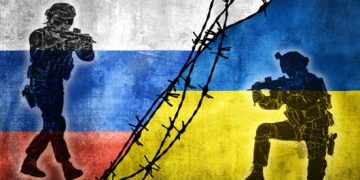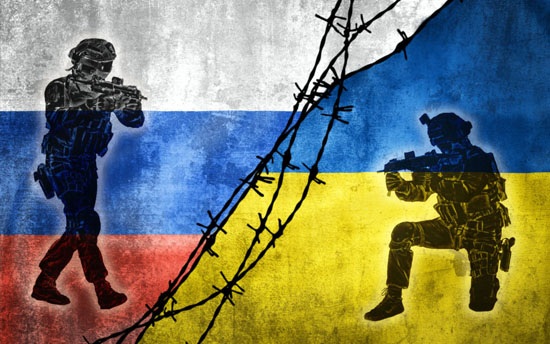Prof Shabir Ahmad
Russia’s Objectives in Ukraine
The goal appeared to make Ukraine neutral by having assurances that Ukraine will not join NATO and replace Ukrainian President Zelensky.
Russia’s aim has been demilitarization of Ukraine, to destroy all its fighting force, air defence and radar system.
To cede Eastern Ukraine (Donetsk, Lushansk, Russian dominated) from Ukraine and secure land corridor to Crimea.
Mariupol and Odessa two major ports are the targets to cut off Ukraine from the Black Sea.
The ultimate aim can be to re-draw the European boundaries where Ukraine as State may not exist at all.
Implications at Global Level
One can observe that Russia-Ukraine conflict started at a moment when US/NATO had already left Central Asia otherwise US/NATO would have been able to open another front for Russia in its backyard or soft-underbelly. Russia considers security of the region as its own responsibility and Central Asia is heavily dependent on Russia for its security, arms and equipments supply. One can assume that Russia waited for the US/NATO withdrawal from greater Central Asia to deal with Ukrainian issue.
Russia as opposed to its expectations has been in a protracted conflict with Ukraine and face economic difficulties under the Western Sanctions. The conflict has profound socio-economic implications for global food and energy market in general and for Central Asian Republics in particular in terms of remittances, trade and security. These developments however provide space and drive the regional countries to make independent foreign policy choices best suited to regional environment and their national economic development.
Russia with 18 % of global wheat supply is the world leading wheat exporter. Russia has the World largest gas reserves followed by Qatar, Iran and Turkmenistan. Russia is also World largest exporter of oil along with Saudi Arabia. Russia and Ukraine both contribute more than a quarter (25.4%) to the global wheat market. The conflict has threatened World food security (wheat supply) as well as already resulting in rising oil & gas prices at global revel. The conflict has also clearly endangered European energy security because more than 25% of European oil & 45% of its gas are being supplied by Russia. The development may lead the world to political as well as social unrest in many countries of the globe. The divide between Western Europe & Russia has enlarged to unprecedented levels, U.S has been successful in rallying Europe behind it, NATO has been made more relevant to Europe while China & Russia providing strategic depth to each other in this context.
Implications for Central Asia
The conflict has put Central Asia in a precarious position. Some of the Central Asian Presidents called upon Russian President while others posted on social media in favor of Russia. All the CARs simply restrained or abstained from voting in UN Security Council Resolution on the Conflict.
Russia still enjoys enormous influence in Central Asia due to the Tsarist & Soviet legacies. Beside close security dependence of Central Asia on Russia, trade and remittances plus geography make Russia more important to Central Asia. The Western sanctions on Russia will squeeze economic activity in Russia that will affect the flow of Central Asian migrant workers sending back huge remittances. These remittances contribute 28 % to Tajikistan GDP, 30% to Kyrgyz and 10 % to Uzbekistan’s GDP. Kazakhstan having 7500 km long border with Russia, 20% of ethnic Russians, has other nature of dependence and limitations vis a vis Russia. Russia is still the largest trading partner of the region though speedily replacing by Chinese growing trade with the region, the region’s agrarian and other primary goods exports to Russia may decline due to sanctions.
However the diverted Russian attention will provide more space to Central Asian Republics to pursue independent foreign policy choices more suitable to regional context. It will also provide space to China to further pursue cross border and energy infrastructure development projects in Central Asia. However, China is still cautious to intervene in the security realm of the region an area sensitive to Russia. Russo-Chinese competition in the region is out of question for seeable future as greater interdependence taking place in form of energy pipelines and due to the process of Eurasian integration. Currently Russia and China have clear roles in Central Asia i.e. security provision and economic development respectively with a consensus to keep their backyard stable and developed.
Implications for Pakistan
The Russia-Ukrainian conflict also put economically weak and debt burdened Pakistan into a precarious position vis-à-vis America and Western Europe. The conflict has clearly divided the world. The ‘West’ expected the ‘Rest’ to follow its stance on the issue squarely without any considerations for a country’s external relations, national interests or regional contexts in which a country has to live and grow.
Necessitated by rapidly changing global and regional geo political orientations, Pakistan and Russia have been in closer cooperation for the last decade or two which culminated in the visit of former Prime Minister of Pakistan to Moscow. This visit unfortunately coincided with the time of Russia-Ukrainian war. The decision of visiting Moscow had the support of all State institutions in Pakistan. Pakistan’s decision to abstain from voting in UN was also a logical choice. Pakistan had even better trade and economic relations with Ukraine prior to the conflict. In 2021 Pakistan-Russia bilateral trade volume reached to $711 million while Pakistan-Ukraine trade amounted to $800 million. Pakistan has taken a principled position that is peaceful resolution of the conflict. The conflict has the potential to implicate Pakistan in a number of ways:
The energy hungry Pakistan would have better chances to benefit from Russian oil and gas resources, technology and experience in absence of this conflict. The global oil prices have sharply risen directly impacting oil importing countries like Pakistan. The wheat supply disruption will also complicate matters for Pakistan as it remained importing wheat from Russia and Ukraine. The future of $2.5 b 1100 km long Pakistan Stream Gas Pipeline might be at risk due to sanctions on Russia. Pakistan-Russia friendly relations may also implicate IMF program for Pakistan.
(The author is Director Area Study Centre (Russia, China & Central Asia)
University of Peshawar)




